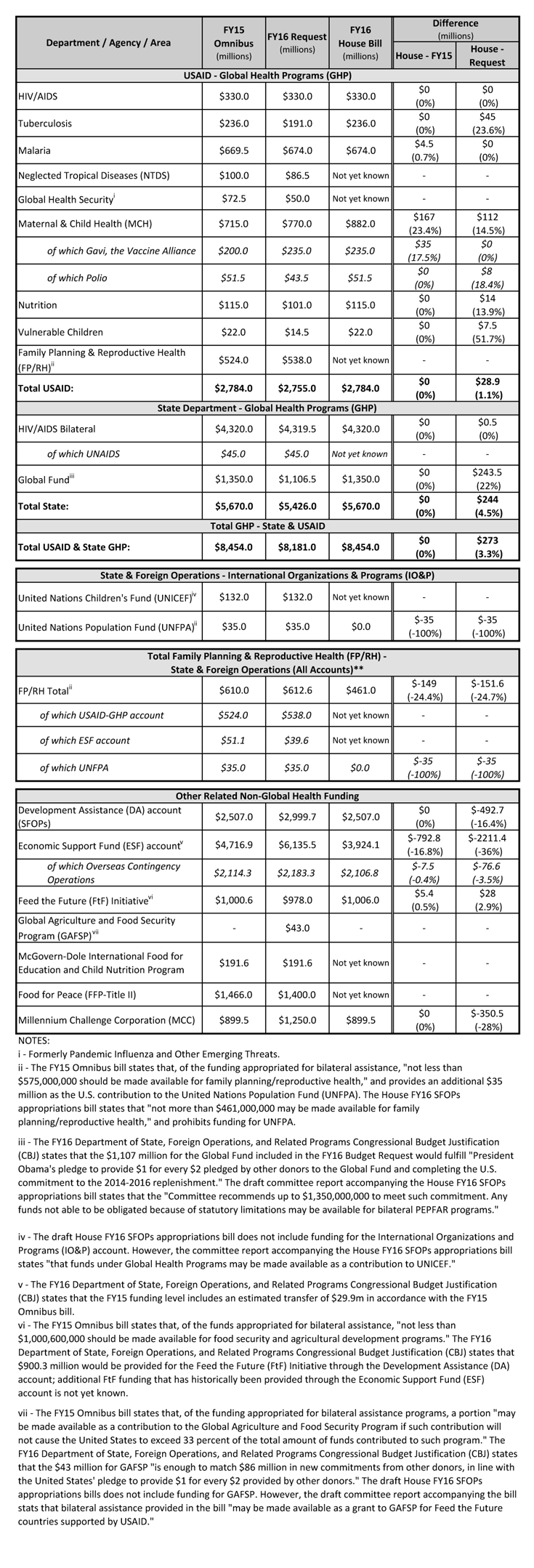House Appropriations Committee releases FY 2016 State and Foreign Operations Appropriations Bill
The House Committee on Appropriations released the FY 2016 State and Foreign Operations Appropriations bill and associated committee report, which includes funding for U.S. global health programs at the U.S. Agency for International Development (USAID) and the State Department (see table below) comprising a significant portion of U.S. funding for global health (total funding for global health is not currently available as some funding provided through USAID, HHS, and DoD is not yet available).
Funding in the bill for global health would total $8.454 billion, $273 million (3%) above the President’s request and matching the FY 2015 enacted level. Funding for bilateral HIV programs as part of the President’s Emergency Plan for AIDS Relief (PEPFAR) essentially matches the President’s request and the FY15 enacted level, as does funding for malaria.
The Global Fund to Fight AIDS, Tuberculosis and Malaria (Global Fund) received the largest increase when compared to the President’s request, but matches the FY 2015 enacted level. The committee report accompanying the bill states that if any of the funding for the Global Fund ($1.35 billion) in FY 2016 cannot be provided due to statutory limitations, these funds should be used for bilateral PEPFAR programs.
Maternal and Child Health (MCH), which includes funding for polio, Gavi, the Vaccine Alliance (Gavi), and UNICEF, received the second largest increase when compared to the President’s request, and the largest increase when compared to FY 2015 enacted levels. However, these increases are in large part due to increased funding for Gavi as well as the inclusion of funding for UNICEF within MCH. In recent years, the U.S. contribution to UNICEF has been provided separately, through the International Organizations and Programs (IO&P) account; however, the House appropriations bill eliminates funding for the IO&P account.
Funding for tuberculosis, nutrition, and vulnerable children, is also above both the President’s request and the FY 2015 enacted level.
Funding for family planning and reproductive health (FP/RH) is the only area that declined (among the known amounts). The bill caps total FP/RH funding at $461 million, $152 million below the President’s request and $149 million below the FY 2015 levels. The bill also included the following policy provisions:
- Reinstates the Mexico City Policy (also known as the “Global Gag Rule”)
- Prohibits funding for the United Nations Population Fund (UNFPA)
Funding for neglected tropical diseases (NTDs) and global health security (formerly pandemic influenza and other emerging threats) was not specified in the bill or the associated report.
The KFF Daily Global Health Policy Report summarized news and information on global health policy from hundreds of sources, from May 2009 through December 2020. All summaries are archived and available via search.

